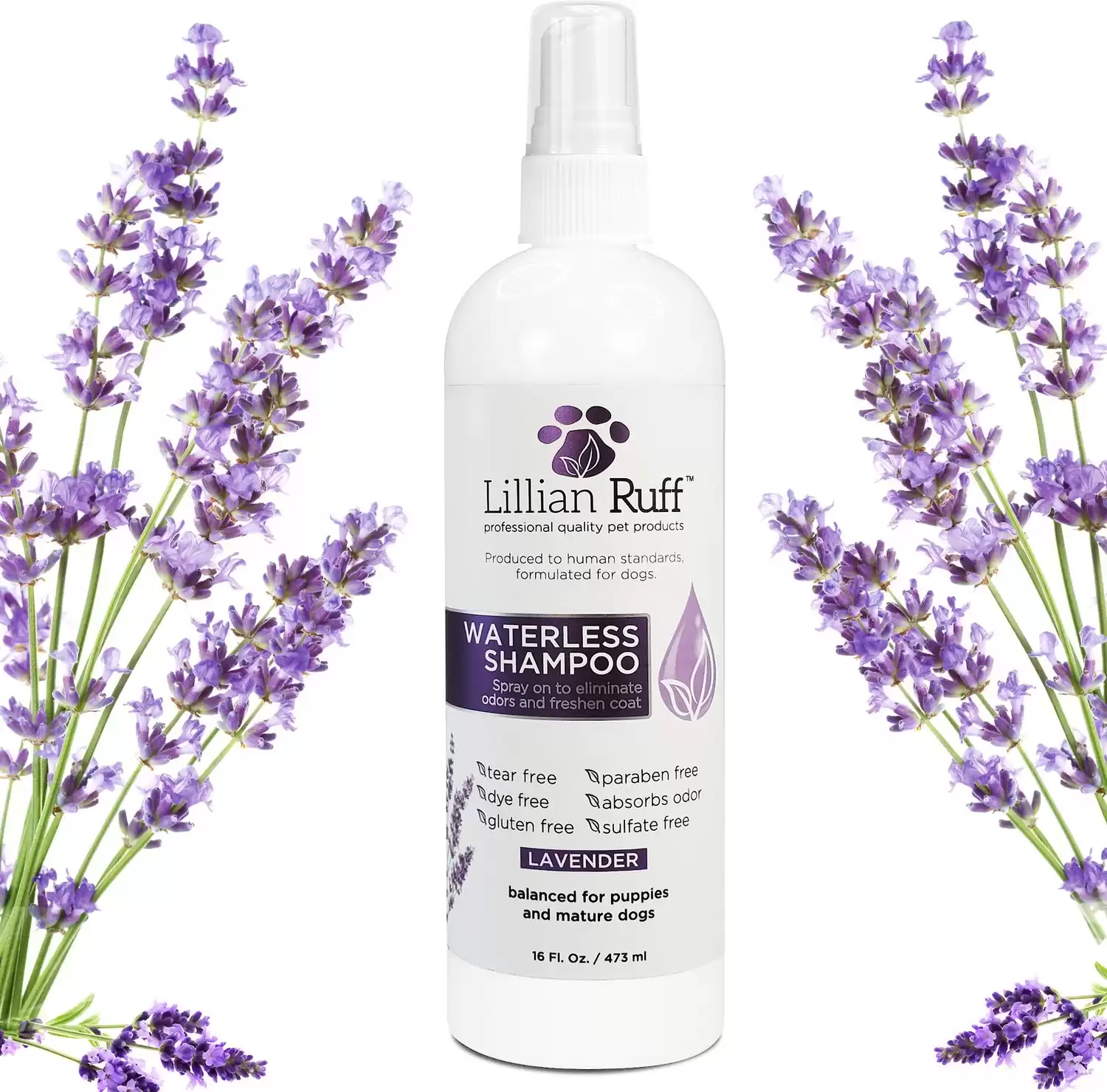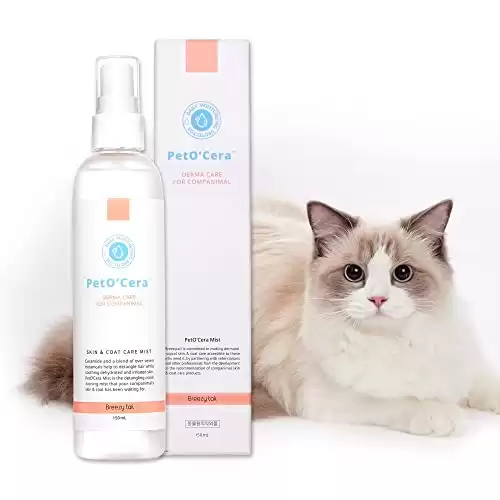Cats, just like dogs, are known as man’s best friends. Some pet owners say they prefer cats over dogs because cats are cleaner. Cats naturally love being clean. They can be seen licking their bodies, or each other’s, about fifty percent of the time.
This always leaves pet owners like you wondering why do cats lick each other? Is it a behavior you should encourage or discourage? Could it indicate an underlying health condition?
The most common reason that cats lick each other is to show affection and strengthen their bond. There are a few more reasons, which we will discuss in detail below.
In this article, you’ll learn why cats lick each other, including a guide on what to do if your cat is licking excessively.
- Made with aloe and oatmeal
- Great to use when traveling
- Moisturize your dog's skin
- Come in three different scents
Reasons Why Cats Lick Each Other
Affection
Cats have different ways of showing affection to each other. Licking happens to be one of them. Licking can be a physical display of love, and confidence cats feel towards each other. Cats with fur and those without fur lick themselves to strengthen their bond.
If you see your cats licking each other, especially in the facial area, this means they love each other, and they are bonding.
Maternal Instincts
The first thing a mother cat does as soon as it gives birth is to lick its kittens. This initial licking helps the kittens to remove the amniotic sacs’ coverings on their face and bodies.
This allows the kittens to breathe properly. After doing this, you’ll see the mom cat chewing the umbilical cords and the placentas. This is a typical cat after-birth behavior. However, you can decide to dispose of the placenta without allowing your cat to feed on it. It doesn’t harm or change anything.
Also, during the first weeks of life, the momma cat will lick her newborn kittens frequently. The momma cat licks the abdomen and anuses of the kittens as well. This action encourages babies to pass out waste. The mom-cat keeps licking their kittens even up to week 3 when they are already learning to groom themselves. Kittens can fully groom themselves by 6 weeks of age.
- Available in a wide variety of pleasing fragrances
- Cleans your cat quickly and effectively without water
- Deodorizes
- Leaves fur feeling soft and smelling great
- Veterinarian recommended
Create a Communal Smell
Licking helps cats to create a communal smell. Cats lick each other to strengthen their ties. Cats are very sensitive to body odor from other cats. Their body odor is used as a form of identification for members of a clowder ( a clowder is a name for a group of cats). Cats with a different odor are seen as a potential threat, and their territorial instincts kick in.
However, cats licking strengthen their ties within the same family. The cats don’t have to be blood relatives. If cats from different litters grow together, they feel a familial bond. This bond is strengthened by licking each other’s coats.
Additionally, if a cat gives birth, the first thing she does is lick her kittens, as stated above. Another reason why a mother cat licks her kittens is to create a communal scent for her litter.
If you hold a kitten and you return it to its mother, the first thing the mom cat would do is lick its kitten again. This licking helps rub off your odor from the kitten and reapply hers.
If a kitten were separated from the mother before she licks it, and the kitten is returned a few weeks later, the momma cat would not treat the kitten as hers. This is because the kitten would have a different body odor, and she won’t be able to recognize her. However, it is advisable you leave a kitten with its mother for about 8 weeks after birth before trying to separate them.
Displacement Behavior
Generally, when an animal experiences high motivation or is torn between two or more conflicting drives, it resorts to its displacement behavior. This is what helps the animal to manage or maneuver around the situation.
Animals often groom as a way to relax or calm themselves when caught in an approach-avoidance conflict. And cats are not an exception.
Cats often lick or groom themselves as a displacement behavior. When stressed, cats lick their paws or bodies to feel better. This behavior lowers the arousal level and helps the cat cope with stress.
For instance, if your cat tries to make a jump and fails, it would most likely lick itself to ease the embarrassment and feeling of failing. Also, if your cat is intimidated by another household animal, it might stop at some point during an encounter and lick itself to calm and relieve the built-up pressure.
- No water required! Simply spray on your cat's hair, gently massage it in, and brush it off
- Formulated with ceramides to seal in moisture and condition your cat's skin and coat
- Restores your pet's healthy skin barrier
- Includes natural ingredients
- Created with veterinarians without harmful ingredients
Temperature Regulation
As a fur-coated creature, your hairy feline friend is equipped for heat-retaining and poorly equipped for heat-release. Your feline friend is often under a lot of heat. This is because cats’ sweat glands are located only in a few hairless areas. These are the paws, lips, chin, and skin around the anus.
These few hair glands are not effective for proper heat loss. So oftentimes, cats lick their bodies to regulate or cool their body temperature. When your cat licks its fur, its saliva has a very low latent heat of vaporization, and once the saliva evaporates, your cat gets cooled in turn. The saliva removes the heat and evaporates.
Cats also lick their fur during cold weather to smooth it and trap air under their furs which keep them warm.
Should You Be Concerned If Your Cat is
Licking Its Lips?
Cats licking their lips is often considered to be a sign of nausea. Most cats lick their lips prior to when they’ll vomit. You should be concerned if your cat is licking its lip, not eating, and vomiting. Take your cat to the vet for proper check-ups and treatment.
Licking Its Fur?
Cats licking their fur is the most common and is considered normal. However, if your cat licks its Fur excessively, you should pay close attention. This can be due to parasitic infestations such as fleas or skin infections.
Cats often lick themselves for comfort. It would often lick a wound or a sore area to comfort the area and feel more comfortable generally. When Cats have bladder pain or urinary difficulties, your feline friend will lick the fur on its abdomen over the location of the bladder to comfort itself.
- Removes loose hair without pulling it off
- Hair simply sticks to the surface
- Features high-quality silicone tips
- Waterproof, can be used to wash your cat
Licking Its Genitals?
Licking genitals is one of the behaviors that come with maternal Instinct. This is to assist the kitten in passing waste, as mentioned earlier. However, excessive licking of its own genitals should bother you. This is because your feline friend might be having a life-threatening urinary problem.
Cats with health conditions like feline urinary obstruction are often seen licking their genitals excessively. If your cat is excessively licking its genitals, watch out for other symptoms like low appetite and urination difficulties. If you confirm these, take your cat to the vet immediately for proper treatment.
Licking Its Wounds?
If you observe your cat constantly licking a certain area. It may be a wound or an abscess. However, carefully look at the area to determine if there’s an underlying problem. This will help you know if it’s a minor small burr in its hair or a wound. If it’s a wound, you should dress and treat it immediately.
When Cats Licking Becomes Excessive
If your cat is generally licking its body excessively, it could be that your feline is feeling so dirty, and a clean bath would help to stop this. Or your cat is just feeling hot, and it’s trying to cool off.
However, if your cat is licking specific areas, you should do a proper examination of that part of their body. Look out for any signs of external parasites or infection, such as swelling, redness, or skin discharge.
Should You Be Worried If Your Cat Doesn’t Lick?
Yes, you should be worried if your cat doesn’t lick. Licking has a lot of benefits for cats. It is a natural behavior of cats. If your cat isn’t licking, it’s probably a sign that your feline friend isn’t feeling good. You should take your cat to a vet and make a complaint so proper treatment can be administered.
What You Should Do if You See Your Cat Licking
If you see your feline friend licking themselves or one another, you can leave them be. As long as it doesn’t seem like your pet is in distress, leave them be.
However, you can decide to help your feline friend out by brushing or combing its fur. Some cats actually enjoy being groomed.
Conclusion
Cats licking each other is a natural behavior that helps your feline friends build a strong bond with one another. However, it’s your responsibility as a pet owner to detect if your pet is in distress and licking excessively. If you notice this, take your feline friend to the vet as soon as possible.
We have some other interesting articles about cats. You can check them out below:
The photo featured at the top of this post is © bombermoon/Shutterstock.com
Thank you for reading! Have some feedback for us? Contact the AZ Animals editorial team.










